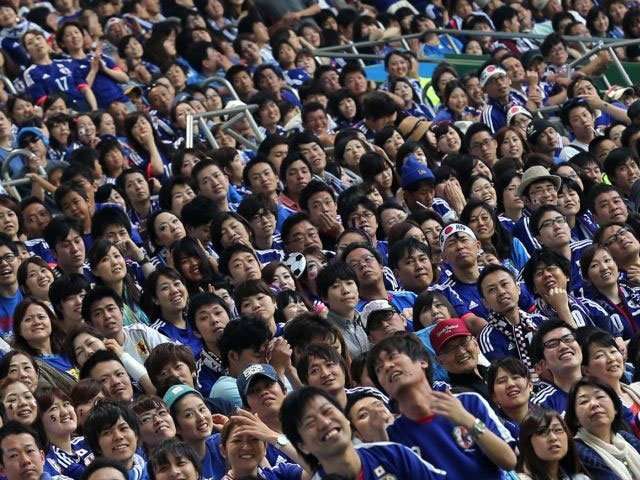Japanese fans who watched their national team be defeated by the Ivory Coast in the Fifa World Cup on Saturday showed it is possible to lose graciously, when they stayed behind after the match to help clean up.
Despite seeing the Blue Samurais lose 2-1 against Didier Drogba's team at the Arena Pernambuco in Recife, Japanese spectators armed with bin liners patrolled their side of the stadium and gathered up discarded litter, Yahoo Sport reported.
While gathering waste after a sporting event is customary in Japan, the spectators’ actions came as a shock to football fans from other countries.
“What a good gesture from Japan,” wrote Twitter user Blas Piguera III, while people of Japanese origin expressed how proud they were of the custom.
Japan: Group C team profile 5 show all Japan: Group C team profile 1/5 How they qualified Finishing top of the group standings was expected to be a formality when you consider the Asian nation’s recent history for qualifying. This will be Japan’s fifth straight World Cup appearance, and their side has perhaps never been stronger, having been the first nation to qualify. The standings certainly reflect that they were one of the strongest sides in qualifying, losing just once and scoring 16 goals in eight games. Alberto Zaccheroni’s side had to recover from a disappointing Confederations Cup display, and have looked impressive against the lower sides in friendlies, but will now need to prepare to face some of the biggest teams in international football later this year. 2/5 Manager A renowned figure in Italy after taking charge of AC Milan, Lazio, Inter Milan and Juventus so far in his career, 60-year-old Zaccheroni has performed admirably at the helm of Japan. In his first match as coach, he led the Asian nation to a famous 1-0 win over Argentina, and this set the precedent for his reign. Of his 54 games in charge, Zaccheroni has won 32 and lost just 11 times, making him one of the most successful managers in Japan’s history. He guided Japan to their fourth AFC Asian Cup title in 2011, which led them to the 2013 Confederations Cup in Brazil. And although they failed to qualify for the latter stages of the competition, experience in the Brazilian climate will be something Zaccheroni can use to his advantage at the World Cup. 3/5 Star player Even though this side contains Manchester United playmaker Shinji Kagawa, Keisuke Honda is still the key man. Creatively, he is a menace, operating behind the main striker Shinji Okazaki, and is certainly not afraid to advance forward with the ball at his feet. Honda is a natural leader and has been touted as a contender to take over as captain when veteran midfielder Endo retires. For a midfielder, his strike rate is impressive, with 20 goals coming in his 53 caps for Japan. He joined AC Milan on a free transfer in January after spells with CSKA Moscow, Nagoya Grampus and Dutch outfit VVV Venlo. 4/5 Emerging talent One of the brightest talents to emerge from Japan in recent years, Sakai found himself being chased by top European clubs and sealed a switch to Stuttgart in January 2013, after a successful loan spell at the club. The 23-year-old attacking full-back is said to be the complete package and has been compared to German international Philipp Lahm since his move to the Bundesliga. Stuttgart honoured Sakai with a three-and-a-half-year deal, but the right-back is likely to remain behind Atsuto Uchida in the pecking order in Brazil. 5/5 Formation: (4-2-3-1) Kawashina; Uchida, Morishige, Yoshida, Nagatomo; Endo, Hasebe; Kiyotake, Honda, Kagawa; Kakitani
Following their wrenching defeat against Ivory Coast, the Blue Samurais are currently 3rd in Group C, and must defeat Greece and Colombia in their remaining group matches to make it past the knockout stages. Many regard the Japanese to be the strongest team from the Asian continent in the World Cup finals.
Japan and South Korea jointly hosted the World Cup finals in 2002, the first time the tournament was held in Asia. At the last World Cup in 2010 in South Africa, Japan made it through their group only to be knocked out by Paraguay in the last 16.
Follow the Independent Sport on Instagram here, for all of the best images, videos and stories from around the sporting world.

jikae on June 16th, 2018 at 17:41 UTC »
That's just Japanese people being Japanese people. Tokyo, for how crowded it is, is the cleanest city I've ever been to.
B3ntr0d on June 16th, 2018 at 15:55 UTC »
This is much part of the culture. In Japan garbage is always placed in the bin. I was in Tokyo in 2002, and after an all night fan rally on the street, the fans, especially the highschoolers, stayed behind to pick up bits of confetti and other small debris.
Mentalfloss1 on June 16th, 2018 at 14:54 UTC »
I always carry out all of my trash after a soccer match. It's very easy to do.